 Petzlover
Petzlover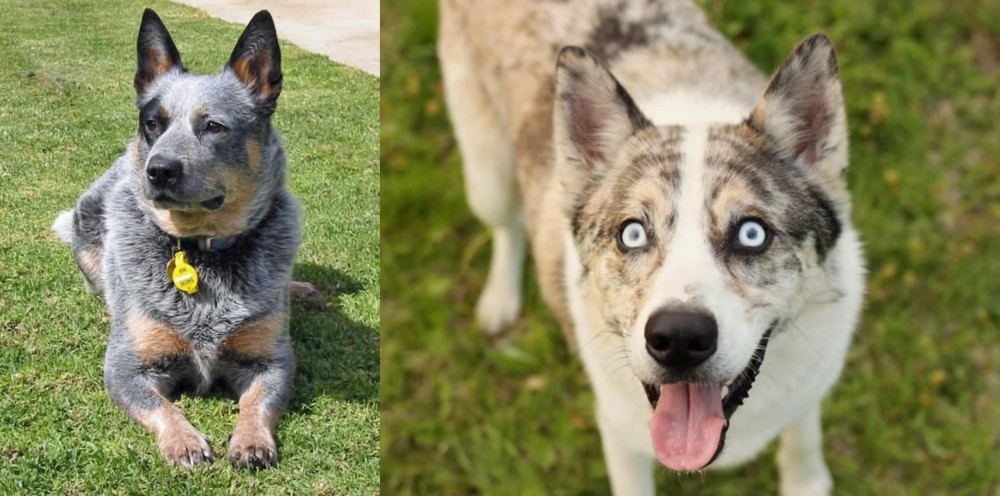 Queensland Heeler is originated from Australia but Shepherd Husky is originated from United States. Queensland Heeler may grow 13 cm / 5 inches shorter than Shepherd Husky. Queensland Heeler may weigh 18 kg / 39 pounds lesser than Shepherd Husky. Both Queensland Heeler and Shepherd Husky has almost same life span. Queensland Heeler may have less litter size than Shepherd Husky. Queensland Heeler requires Low Maintenance. But Shepherd Husky requires Moderate Maintenance
Queensland Heeler is originated from Australia but Shepherd Husky is originated from United States. Queensland Heeler may grow 13 cm / 5 inches shorter than Shepherd Husky. Queensland Heeler may weigh 18 kg / 39 pounds lesser than Shepherd Husky. Both Queensland Heeler and Shepherd Husky has almost same life span. Queensland Heeler may have less litter size than Shepherd Husky. Queensland Heeler requires Low Maintenance. But Shepherd Husky requires Moderate Maintenance
 Another name for Queensland Heeler is Australian Cattle Dog or Blue Heeler.
Another name for Queensland Heeler is Australian Cattle Dog or Blue Heeler.
These dogs have always been known for herding cattle. The term ‘Heeler’ comes from the dog’s working style – nipping and biting at the cattle’s hooves.
He was was an Australian cattle dog for Australian settlers in the 1800s. It is believed that Thomas Hall created one of the foundations of the Australian Cattle Dog breed by crossing crossing sheepdogs with Dingos.
The Blue-colored dogs have been the most popular, being known as the Blue Heeler.
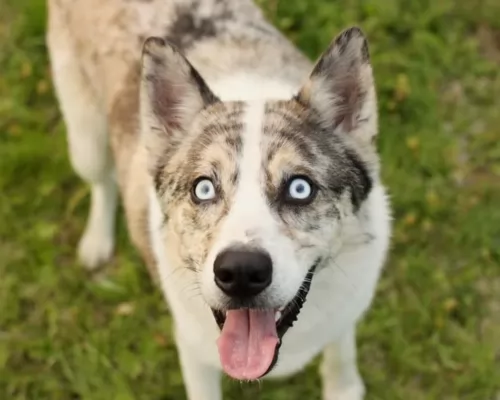 What a beautiful dog the Shepherd Husky is. He is a mix between the Husky and the German Shepherd. Other names for him include Gerberian Shepsky, German Husky and Siberian Shepherd.
What a beautiful dog the Shepherd Husky is. He is a mix between the Husky and the German Shepherd. Other names for him include Gerberian Shepsky, German Husky and Siberian Shepherd.
The German Shepherd originated in Germany and the Husky is from Siberia. We assume this mixed breed dog was bred in the USA. The true origin of the German Shepherd Husky dog is unclear but both the parent breeds have long histories.
The dog is recognized as a Hybrid by both the Dog Registry of America as well as the American canine hybrid Club.
 The Queensland Heeler is a medium sized dog that stands between 43 and 51cm in height, both male and female. The dog weighs in the region of 15 to 22kg.
The Queensland Heeler is a medium sized dog that stands between 43 and 51cm in height, both male and female. The dog weighs in the region of 15 to 22kg.
He has a short double coat with colors being blue, mottled blue and also red speckled. You’ll also find black and tan coloring on this active dog.
He is strong, lean and muscular with medium sized ears that are erect. The eyes are dark and alert, the legs straight and strong. The tail can be docked or left long.
The Australian Cattle Dog is a high-energy working dog that you won’t easily find lying around. The alert eyes are consistently looking around for action and he can’t be bored otherwise he could resort to digging or other destructive behavior.
He is loving to his entire human family, but being particularly attached to just one family member. He is also protective, taking his guarding role of his family seriously.
He gets on well with children and other pets but you’ve just got to keep your eyes on him around children as when excited he can give a nip or two.
Training and socialization will be important for this dog, particularly because he can be strong-headed, willful and stubborn.
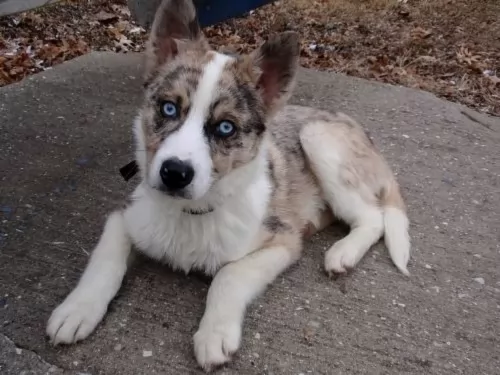 Solid and strong, the German Shepherd Husky mix is attractive. He is a fairly large dog standing at 51 to 64cm in height and weighing between 20 to 40kg.
Solid and strong, the German Shepherd Husky mix is attractive. He is a fairly large dog standing at 51 to 64cm in height and weighing between 20 to 40kg.
They’re powerful dogs these as they have a long history of being working dogs. The eyes of this beautiful dog can be brown, green or blue or a mix of these. The thick double coat protects them from the cold and in the warmer months, he sheds quite a bit.
The coat can be brown, black and tan or it can have creamy shades and be mixed with grey and white too.
The Shepherd Husky is a friendly, amicable dog who wants to please his owner. Training and socialization make him even more well adjusted. He is a dog that will get on well with children in the home as well as other dogs.
He is such an all rounder this dog – loyal, intelligent, social and loving - being great for accompanying you on walks and hikes but being willing to sit with you indoors too.
While he is adaptable and good natured and will happily live with his owner in the city or the countryside, he is better suited to life in the countryside. He also makes a great guard-dog.
 Active, intelligent, feisty, brave, playful, loving – these are just some of the wonderful characteristics you get when you bring a Queensland Heeler into your home.
Active, intelligent, feisty, brave, playful, loving – these are just some of the wonderful characteristics you get when you bring a Queensland Heeler into your home.
True, he is independent, self-willed and stubborn, but training and socialization can take away all the rough edges.
He forms a strong bond with his human owner, and once you’ve had one of these amazing dogs in your life, you’ll be convinced that dogs are truly man’s best friend.
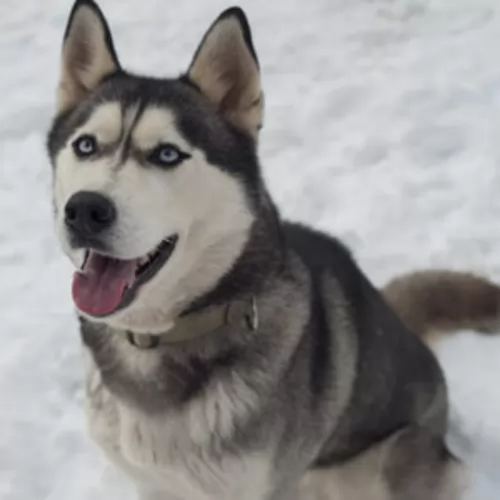 The German Shepherd Husky mix is such an ideal dog for single people, couples and families. This wolf-like breed is intelligent, loving,social and protective – the ideal family dog.
The German Shepherd Husky mix is such an ideal dog for single people, couples and families. This wolf-like breed is intelligent, loving,social and protective – the ideal family dog.
For those looking for an active dog that can be their jogging, walking and camping partner, this dog is for you. He loves to be busy, but he also loves being made a fuss of indoors too.
He has so many excellent qualities and is one dog breed that ticks all the right boxes for being such an all-round splendid pet and companion.
 Australian Cattle Dogs are healthy. Every dog, even the most healthiest breeds, can succumb to some of the common dog illnesses there are.
Australian Cattle Dogs are healthy. Every dog, even the most healthiest breeds, can succumb to some of the common dog illnesses there are.
This is an inherited condition, so if you’re looking for a puppy, be careful about the breeder you buy from.
This is another inherited condition where the thighbone of the dog doesn't fit properly into the hip joint. Your dog is usually so active but with this problem he may well be in pain and actually be lame. Your pet can even develop arthritis . The idea is to get your pet to the vet because it can be unbearable to see him in pain and unable to get around.
This eye disease can mean deterioration of the retina. You'll recognize the signs when you see your dog unable to navigate around your home during the night. He is night blind but later on he can’t see during the day either.
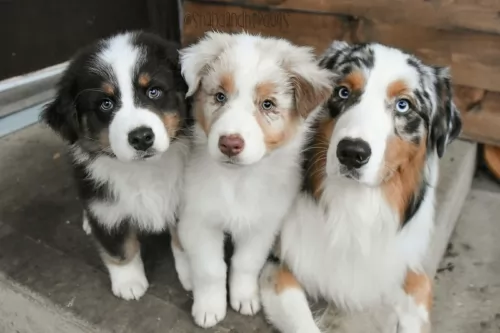 This is such a robust dog that you an scarcely think of him being sickly and yet there are some illnesses that are common to all dogs and which your German Shepherd Husky mix might get as well.
This is such a robust dog that you an scarcely think of him being sickly and yet there are some illnesses that are common to all dogs and which your German Shepherd Husky mix might get as well.
Hip dysplasia is common in German Shepherd dogs as well as arthritis and thyroid dysfunction. Bloat and cancer are other diseases to watch for.
Canine hip dysplasia is a genetic disease characterised as a disease of the hip. The malformation can lead to arthritis and pain and ultimately lead to the loss of hip function, crippling your dog.
You will need to get your pet to the vet for treatment to make his life more comfortable.
 To cope with his life on the Australian Outback, the Queensland Heeler is known to be a low maintenance dog.
To cope with his life on the Australian Outback, the Queensland Heeler is known to be a low maintenance dog.
The thick coat does shed and it can get dusty so a good brush twice a week is all that is basically required for this dog. If his nails don’t wear down naturally, you will need to have them trimmed. As with every dog, you will need to give attention to his ears and teeth.
This is an extremely active dog. He is going to be needing both mental and physical stimulation to avoid boredom, after all he is used to an active lifestyle herding cattle. Hikes, swimming, running – you name it – he’ll join you with all your activities.
Your Queensland Heeler is such a vibrant dog, full of the joys of living, and you want to ensure he has good food to eat to ensure he stays like that.
For convenience you get some excellent commercially manufactured dog foods. Your Blue Heeler is such a wonderful companion dog that you want to spoil him a bit and give him some delicious home-made food too. Boiled chicken, brown rice or pasta and spinach, sweet potatoes and carrots are a healthy choice for your pet – plain and simple just like dogs love it. Chop it up and add it into the high quality dry kibble a couple of times a week.
Some raw meat added in from time to time will help his skin and coat remain healthy. Never leave him without a constant source of fresh, cool water.
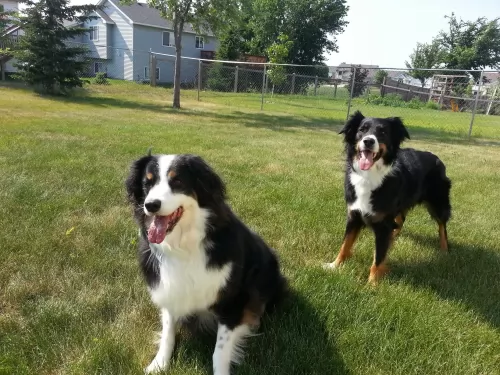 ◆Brush the coat of your Shepherd Husky twice a week to rid the coat of loose hairs. This dog’s hair sheds quite heavily as the weather warms and he may require brushing more often.
◆Brush the coat of your Shepherd Husky twice a week to rid the coat of loose hairs. This dog’s hair sheds quite heavily as the weather warms and he may require brushing more often.
◆When you brush him, check the ears and eyes for infection. The eyes must be bright and clear.
◆Feed your Shepherd Husky the best food there is as he is an energetic, working breed. The commercially manufactured foods can be a good, convenient choice but you need to make sure it is one of the better brands.
Some of the cheaper brands are full of bad ingredients that can make a dog sick.Try and give him some home-made foods that are healthy and nutritious. This food can be added to his dry kibble twice a week.
Boiled chicken, brown rice or pasta and spinach, sweet potatoes and carrots are a tasty healthy choice for your pet. Try and include some raw meat into the diet as well.